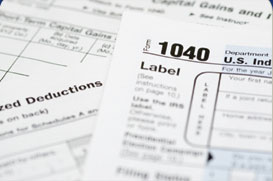
(760) 765-0343

April 2012 Tax Alerts
IRS expands “Fresh Start” initiative. Penalty relief for unemployed.
The IRS announced an expanded “Fresh Start” initiative Wednesday to help struggling taxpayers with a number of measures for relief (IR-2012-31). One of the most noteworthy of these measures is the abatement for the 2011 tax year of the failure-to-pay penalty (0.5% per month of the tax due up to a maximum of 25%) until Oct. 15, 2012, provided the tax, interest, and any other penalties due are paid by that date. The IRS cautions that taxpayers who qualify should still file their 2011 returns by April 17, 2012, or file for an extension to Oct. 15, 2012, because failure-to-file penalties are not being waived.The penalty relief is available to taxpayers whose income does not exceed $200,000 for married filing jointly or $100,000 for single or head-of-household filers, and cannot be used by taxpayers who owe more than $50,000.
New Form 1127-A, Application of Extension of Time for Payment of Income Tax for 2011 Due to Undue Hardship, must also be filed to qualify for relief.
Although the IRS frequently provides penalty relief to victims of disasters, offering relief to both unemployed taxpayers and the self-employed who have suffered reduced incomes is unprecedented.
The IRS said it is doubling the dollar threshold for tax balance due amounts that qualify for the streamlined installment agreement program. Effective immediately, the threshold for taxpayers using an installment agreement without supplying the IRS with a financial statement (Form 433-A, Collection Information Statement for Wage Earners and Self-Employed Individuals, or Form 433-F, Collection Information Statement) is raised from $25,000 to $50,000 (which was itself raised from $10,000 to $25,000 in the first Fresh Start initiative (IR-2011-20)). The maximum term for streamlined payment agreements was also raised from five years to six years. The IRS emphasized that taxpayers can set up an installment agreement by going to the online payment agreement page (OPA) at www.irs.gov.
Late Filing Penalties
Sometimes smart people forget to do smart things — and when taxes are involved, a lapse of memory may be costly. For example, two penalties can apply if you forget the federal income tax filing deadline.
The failure-to-file penalty is assessed each month or part of a month from the due date until you submit your return. The penalty is calculated on the net amount of tax you owe — so no tax due means no penalty.
The failure-to-pay penalty comes into play when you owe tax but fail to pay it by the due date of your return. This is true even if you received an extension of time to file the return.
When both situations apply — that is, you did not file a return and you would have owed tax if you had — the penalties can be combined.
The failure-to-file and failure-to-pay penalties may be abated when you have good reason for forgetting to send in your return and/or your payment. What's a good reason? One example is when paying the tax would cause undue hardship, such as a situation where you are forced to sell property at a sacrifice price.
An extended period of unemployment may also qualify you for relief. As an illustration, you could request a one-time extension to pay your 2011 income tax if you were unemployed for 30 consecutive days during the fifteen months prior to April 17, 2012. The extension may also be available if your 2011 business income dropped by 25% or more due to economic conditions.
Give us a call if you haven't yet filed your return or paid your income tax for 2011 or an earlier year.
Correspondence: P.O. Box 1934, Julian, CA 92036 E-mail: rebeccaorjan(at)luersdyercpa.com
(760) 765-0343 (760) 765-0150 Fax
(760) 765-0343 (760) 765-0150 Fax



© Luers & Dyer, CPA, LLP. All Rights Reserved.